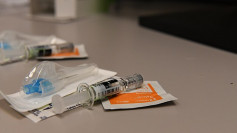The United States is currently facing what public health experts are calling an unprecedented surge in sexually transmitted infections (STIs), with the National Coalition of STD Directors labeling the situation as nothing short of an "out-of-control" epidemic. The Centers for Disease Control and Prevention (CDC) underscores this dire assessment in its latest annual surveillance report, which starkly reveals that over 2.5 million cases of chlamydia, gonorrhea, and syphilis were reported across the nation in a single year.
"The relentless increase in STIs is a clear and present danger to public health," said Dr. Andre Ilbawi, the World Health Organization's lead expert on cancer and a seasoned cancer surgeon who has witnessed the devastating impact of untreated STIs firsthand during his volunteer work in Kenya. "The disparity in outcomes between those with access to early detection and treatment in wealthier countries versus those in lower-income regions is not just alarming-it's a profound injustice."
Syphilis, in particular, has seen an alarming 80% increase in all stages over the past five years, according to the CDC's data. However, it's the sharp rise in congenital syphilis cases, where the infection is transmitted from mother to child during pregnancy, that has health officials most worried. In 2022 alone, the United States reported more than 3,700 cases of congenital syphilis, marking a staggering 937% increase over the past decade.
Laura Bachmann, the CDC's Director for STD Prevention, expressed the gravity of the situation in stark terms: "These infections resulted in 282 stillbirths and infant deaths in 2022 alone," she said. "What makes this particularly tragic is that timely testing and treatment during pregnancy could have prevented 88% of these cases."
The CDC and other public health bodies are now urging for an aggressive approach to stem the tide of this epidemic. "We need swift innovation and collaboration from all corners of the public health sector," Bachmann emphasized. The call to action has been echoed by numerous health associations, including the National Association of County and City Health Officials (NACCHO), the American Sexual Health Association, the American Academy of Family Physicians, and, notably, the National Coalition of STD Directors (NCSDDC).
"The latest data from the CDC paints a grim picture of a nation grappling with a rapidly deteriorating public health crisis with real lives hanging in the balance," the NCSDDC stated. "Syphilis, in particular, will continue its devastating ascent until we see a concerted effort from the administration and Congress to equip communities with the necessary resources for fundamental screening, treatment, and preventive services."
Despite President Biden's multi-agency strategy to combat the rising tide of STIs, there remains a cloud of uncertainty over the funding and resources required to implement these plans effectively. Last year, NCSDDC Director David Harvey cautioned that without sustained health funding, the administration's STI prevention efforts could be jeopardized.
"The Biden administration's focus on the severe consequences of the nation's STI epidemic, particularly congenital syphilis, is commendable," the NCSDDC acknowledged in its latest statement. "However, without the essential funding for communities to carry out these critical health services, such federal leadership risks being ineffective."
The CDC's call to action, bolstered by a chorus of support from health organizations, underscores the urgent need for a comprehensive and well-funded approach to address this growing public health crisis. With STIs, particularly syphilis, on a relentless rise, the time for decisive action is now.






